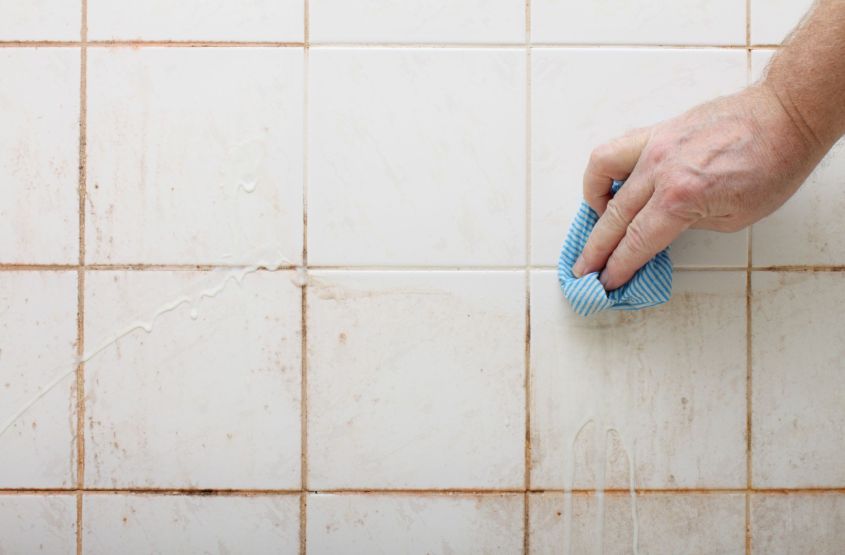Glossy, plain or patterned tiles in bathroom, kitchen, or other living space of a home, are prone to dust and stains. This makes it essential for every homeowner to know how to clean the floor and wall tiles and prevent grout haze.
Whether ceramic or porcelain, tiles are easy to clean and maintain – all you need is time and willingness on your side. Tiles require to be mopped or cleaned regularly in order to prevent the build-up of dirt, dust, or stains.
Once the tiles and grout become dirty, you need some effective cleaning hacks to bring back the original shine.
People will suggest that you can clean tiles with water and sponge once a week to keep them shining, but we’d say there are many other ways that you can try.
Here are some simple tile grout cleaning hacks that’ll help you make your tiled floor and walls look new again.
How to Clean Tile Grout Using Vinegar
With hundreds of tile cleaners available on the market, choosing the right one that suits your floor can be challenging. In that case, why not try a homemade tile cleaner.
White vinegar mixed with warm water is one of the safest and best ways to clean dirt and grime building up over tiled floors and walls.
Create a mixture of white vinegar and warm water – use ½ to 1 cup of vinegar in every gallon of water. After thoroughly cleaning up the area, mop the tiles with this solution and leave it to dry for a few minutes. Now use an old toothbrush to scrub off excess dirt, or dust.
Thorough rinsing and mopping of tiles with clean water will remove all the cleaning agent and dirt settled on the tiles and grout. The vinegar and water solution will not only clean the tiles but also work as a natural deodorizer.
This natural tile and grout cleaner becomes even more effective when you add a pinch of baking soda to the solution. Baking soda can leave a film on tiles, but using mild soap and water, it comes off completely, leaving you with sparkling tiles.
When using this homemade tile cleaner, keep in mind that it would not be as effective as in all cases. Vinegar can have adverse effects on certain flooring materials such as marble and limestone.
So, if you’ve used some kind of natural stone for flooring, refrain from using acidic cleaners.
Also Read: 15 Bathroom Decor Ideas to Improve Appeal and Function
How to Clean Tile Grout Using Bleach/Hydrogen Peroxide
Grout, the colored mixture holding tiles together, is an element that attracts dirt and snatches away the beauty of floor tiles over time. You might have heard of cleaning properties of bleach, but it is advised to not use it indoors, as it is toxic and pollutes the air.
Hydrogen Peroxide is a non-toxic alternative to bleach, which can be used to clean grout between tiles.
Begin with spraying a small quantity of Hydrogen Peroxide solution over the tiles and let it sit for a couple of hours. Later scrub it with a brush and clean it off with a mop or wet cloth and restore the sparkling clean look of your floor.
Adding baking soda to the solution will further improve the cleaning performance without causing any damage to the tile surface. The combination of baking soda and Hydrogen Peroxide is very effective and is perfect for removing old stains.
How to Remove Oil Stains from Tiles
While cooking, it is obvious that some oil will splitter over the countertop, backsplash, and other surfaces of your kitchen, making it look dull and old.
Cleaning the greasy stains frequently is the best cure, but if you’ve left them sitting there for a while, it would be hard to clean them up.
A mixture of baking soda and Hydrogen Peroxide is a winning cleaner that’ll clean your tiles and won’t cost you a fortune. However, dish soap can also do wonders.
Begin by softening the grease with warm water and then clean up leftover residues with the paper towel or sponge soaked in warm water. You can use mild dish soap or washing soda to remove stubborn stains and even add some essential oil for a fresh odor.
It is important to wipe the excess particles with a damp cloth before mopping the entire surface. You may need to repeat these steps a couple of times to get the best results.
How to Remove Hard Water Stains from Tiles
Tiles are considered one of the most water-resistant flooring materials, but they aren’t completely foolproof. Over time, minerals present in the water can accumulate on the tile and grout, leaving disgraceful hard water stains behind.
It is advisable to wipe off the floor after every use to ensure water stains don’t build up.
But we understand, such precaution is entirely impossible. If you weren’t careful enough and white stains have gripped all the sighted areas of your floor, the only option is to clean up these water stains with a good cleaning agent and, of course, your muscles.
A combination of white vinegar and baking soda is a great homemade recipe to clean hard water stains from tiles. The acidic properties of vinegar can loosen hard water marks, while baking soda serves as a scrubber to remove the alkaline mineral deposits.
Next, a rub of dish soap can help restore the shine. You can even use lemon to clean these water marks, but that can be really straining.
How to Clean Tile Floors in Bathroom
Mold build-up on grouting lines of tiles creates an ugly and unhygienic condition, especially in the bathroom. Before knowing about how to clean mold off bathroom floor tiles, you need to know how it is formed.
It is typically caused by moisture seized in the bathroom. It is thus important to ventilate your bathroom properly.
Fortunately, there are various ways to clean mold and mildew from bathroom floor tiles. You can use baking soda, bleach or white vinegar as a natural cleaning agent and later rinse them off with water to get rid of mold and other stains.
Regular and efficient cleaning is the key to keep tiles free of stains and mold. Simply cleaning them with hot water is not a feasible option. You’ll need cleaning agents and a scrubber for tough stains.
7 Common Tile Grout Cleaning Mistakes to Avoid
When cleaning tile grout, you must avoid the following mistakes:
1. Never use harsh cleaning agents: Using harsh cleaning agents, like bleach and ammonia, may ruin the grout and tiles in the long run. So, only use such a cleaning agent on a limited basis. Such chemicals may give a brilliant shine to your tiles and grout, but only let professional cleaners use them in the right proportion. For cleaning the tiles yourself, it’s best to stick to the mild cleaning solutions.
2. Don’t miss regular cleaning: Not cleaning the tiles or grout regularly allows dirt and grime to accumulate on these surfaces. If dirt sits on the tile and grout for a longer time, it may become difficult to clean. So, you must clean them regularly.
3. Never scrub tiles and grout vigorously: Vigorous cleaning of tiles and grout can leave scratches on the tiles or pull of the grout lines. Plus, never use abrasive cleaning tools, like steel wool, abrasive brushes, and scrubbing powder that could scratch the tiles. It’s best to use rags and soft clothes for wiping grout.
4. Avoid cleaning grout with beater bar: Beater bar is not meant for cleaning the tile floor, as it could scratch the tile and make it appear dull. Always turn off the beater bar when using a vacuum cleaner for cleaning tile flooring.
5. Don’t let stains and spills sit for too long: Immediately remove any stains or spills from the tiles and grouts to easily make your tiles shiny again. Stains could discolor the carpet, so it’s better to act faster and wipe off any spillage immediately.
6. Don’t forget to use furniture protectors: Always use furniture protectors on the bottom of chairs, vanity, table legs, etc. It helps in protecting your tile floor from chipping or cracking when you move the furniture.
7. Don’t forget to seal and caulk the grout: Caulking is done on tile surfaces that are exposed to moisture. It helps in preventing the tiles from peeling away. Moreover, sealing is done to protect grouts from wearing, staining, tearing, and other damages. So, never forget sealing and caulking the grouts to make them more durable and stronger.
Always avoid these mistakes to ensure your tiles remain shiny and reliable for many years to come.
Follow Homecrux on Google News!




